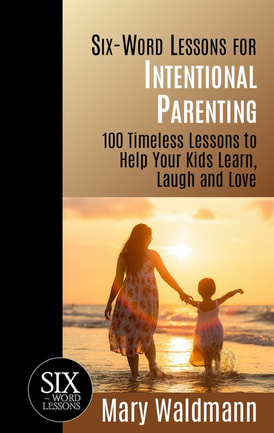 If you’ve been reading my blogs on parenting, you’ve heard me bemoan the heavy use of cellphones and other screens by young children and teens and how damaging it can be to social and intellectual development. Now comes Erika Christakis in the July/August Atlantic Monthly who says that when it comes to children’s development, we should worry less about their screen time and more about our own. In her article, The Dangers of Distracted Parenting she cites research that, despite the increase of women in the workforce, today’s mothers (and fathers) spend astoundingly more time with their children than did parents of the 1960s. But our engagement is increasingly low quality: while parents are physically present in their children’s lives, they are far less emotionally attuned, primarily due to screen distractions. Now this isn’t to discount the direct risk that screens pose to children and today’s preschoolers spend, on average, four hours a day facing a screen. There’s no question that time spent with a screen is time not spent exploring the world or interacting with others. But, as Christakos points out, “for all the talk about children’s screen time, surprisingly little attention is paid to screen use by parents themselves, who now suffer from ‘continuous partial attention’” which harms not just us, but our children as well. We’ve long known that human learning is based on emotional cueing, the prime example of which is responsive communication. Child development is relational---babies can be taught things by human interaction, even with other babies, that they cannot learn from a screen. According to one expert, “Language achievement is the single best predictor of academic success and the key to strong language skills are those back-and-forth fluent conversations between young children and adults.” A problem arises when the developmentally essential back-and-forth emotional cueing between adult and child is constantly interrupted by a text or a quick check of e-mail. Christakos agrees that it’s not easy to balance adults’ and children’s needs---your child will never be your unwavering center of attention. Parents have long left children in the playpen or the backyard to amuse themselves at times. Occasional parental inattention may even build resilience. Chronic distraction, however, is a totally different story. A tuned-out parent is much quicker to misread emotional cues from the child, or to become irritated or angry when the child just wants attention. Short, intentional disengagement---like saying you need a half hour to complete a task---isn’t going to harm your child. But chronic inattention sends a clear message to your child that your smartphone messages, texts and Instagram are more important to you than the child. And this is true for your teens as well as younger children. Just ask a few teenagers. Children are hardwired to get what they need from adults and will do a lot to get a distracted parent’s attention. If we don’t change our behavior, they will attempt to do it for us and we can expect more tantrums from little ones and acting out by older children. But eventually children will give up. As Christakos says, in child development it takes two to tango and well-known studies from Romanian orphanages have shown us how babies’ brains fail to develop when they lack a willing dance partner. As Christakos concludes, we find it far easier to focus on our children’s screen time than to turn off our own devices, but we really need to start paying attention. “Put your kid in a playpen, already. Ditch the soccer-game appearance if you feel like it. Your kid will be fine. But when you are with your child, put down your damned cell phone.” I say ‘Hear, hear!”  A graduate of Stanford University, Mary Waldmann and her husband Raymond raised three children who are now independent, well-adjusted and happy young adults. Before becoming a mother, she was a successful real estate broker, political consultant and public relations executive, and worked as a part-time communications consultant when her children were young. Mary is the author of Six-Word Lessons on Winning with Today's Media , Six-Word Lessons for Intentional Parenting, and Six-Word Lessons for Compelling Speeches.
0 Comments
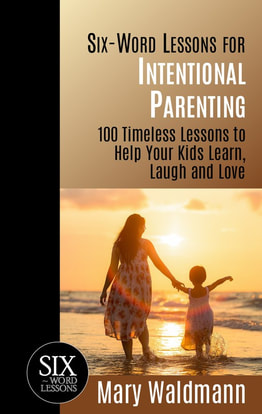 Those of you who’ve read my book Six-Word Lessons for Intentional Parenting know that my husband and I fostered our kids’ autonomy and independence in a number of ways, including involving them in family vacation discussions, assisting them—as age-appropriate--to work out their own solutions to various problems and disputes, giving them—again age-appropriate—freedom to ride bikes in the neighborhood, run lemonade stands a block from home, advocate for themselves with teachers, and make some of their own decisions. Sometimes the clothes didn’t match, or they waited to the last minute to file college applications, but we thought it was important for them to learn independence and autonomy as they grew. Sometimes their choices led to bad decisions, but they were able to learn from the consequences when the stakes were relatively small. We worked very hard to keep our children safe and teach them to be aware of their own safety, but we tried not to over-manage their lives. Now comes mounting scientific evidence that overzealous parenting and protection can do real harm. Psychologists and educators see it as one factor fueling a surge in the number of children and young adults being diagnosed with anxiety disorders. I recommend The Overprotected American Child by Andrea Petersen in the June 1, 2018 Wall Street Journal. She reports that a survey of 31,000 college students found that the number diagnosed with or treated for anxiety problems more than doubled between 2008 and 2017. And another study shows that the parenting behavior that had the strongest impact of any kind was granting autonomy, defined as parental encouragement of children’s opinions and solutions to problems. More autonomy led to less anxiety. And for children who are predisposed to be anxious, overprotecting reinforces their impression of the world as a dangerous place and their powerlessness. Lack of autonomy and independence can also stymie development of self-confidence and lead children to defer to their parents for decision-making even as adults. Of course, children mature and develop skills at different rates and that needs to be factored in when deciding how much independence and freedom they should be allowed. But a four-year-old is certainly old enough to choose clothes, pick bedtime stories, and choose from a restaurant menu. And by ten or eleven, most kids have learned to safely cross the street and can be trusted to walk to school or to a nearby friend’s house without adult supervision. As parents, we need to encourage independence in small, low-stakes situations in order to help our children develop the skills, including decision-making, that they will need as adults. Encourage them to participate in discussions about their path toward independence and what they feel ready for. As one expert points out, they automatically start to make better decisions because they are thinking, rather than just acting. In granting new freedoms, both parents obviously must be on the same page, but it’s also helpful if a group of parents in the neighborhood or among the kids’ circle of friends get on the same page as well. That way there’s less likely to be finger-pointing at the “lax parent” or resentment between kids about what they have and are allowed to do. If we teach our children to be on their own in age-appropriate ways, we teach them that the world isn’t something to be anxious about, but a place they are fully capable of navigating. The ultimate goal of parenting is to have our children be totally autonomous before they leave for college or the workplace. Of course, the results of their decisions won’t always be what we wish but they will learn from the experience and choose more wisely in the future. With the independence to make your own decisions comes the right to make a wrong decision. As difficult as it can be for us parents to allow our children that freedom, even in the early stages, it’s the only way they can become fully functioning, successful adults. And isn’t that what we all want for our children?  A graduate of Stanford University, Mary Waldmann and her husband Raymond raised three children who are now independent, well-adjusted and happy young adults. Before becoming a mother, she was a successful real estate broker, political consultant and public relations executive, and worked as a part-time communications consultant when her children were young. Mary is the author of Six-Word Lessons on Winning with Today's Media , Six-Word Lessons for Intentional Parenting, and Six-Word Lessons for Compelling Speeches. 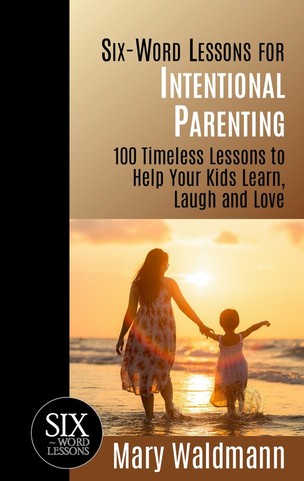
My husband and I just finished reading Being Mortal by Atul Gawande and found it extremely thought-provoking. It should be a “must read” for anyone over 50 and anyone with parents who are aging. We all want the best possible quality of life for our parents and ourselves in the declining years, but how do we go about assuring it? Gawande provides a lot of context, raises a lot of questions, and provides some answers.
According to the book’s description, “Modern medicine has transformed the dangers of birth, injury and disease from harrowing to manageable.” But when it comes to the inescapable realities of aging and death, medicine often does the opposite of what it should be doing. Calling on both research and compelling, moving stories of his own patients, Gawande reveals the suffering caused by the lack of attention to what people really want as they age. To find that out, doctors and we all need to ask questions and have some tough discussions, but by-and-large we haven’t been doing that. We fail to realize the choices we’re making, or that are being made for us, because the doctors are not really talking to us, and we’re not asking the right questions. If we want not only a good death but a good life, both sides need to start talking honestly about realities and choices.
He looks in-depth at the cultural evolution in assistance and care for the aging and details in fascinating terms the whole evolution of “retirement living” and assisted care. And we discover that while some facilities have beautiful lobbies and fancy brochures, they frequently play on the guilt of children in marketing and many are little more than glorified nursing homes. After reading Being Mortal, I have a lot more questions I would ask of a facility before choosing it for myself or a loved one. Personal autonomy is frequently the primary desire for aging folks and it’s frequently the first thing diminished in an institution for the aging. When it’s lost, physical decline can rapidly set in. Yet when institutional decisions are made or seemingly some simple changes implemented to improve autonomy and surroundings, patients generally improve both physically and emotionally, leading to less depression and less medication, leading to much better quality of life. A riveting, humane and very honest book, Being Mortal shows how our ultimate goal should be a good life to the very end. The book is not just for those of us who are aging or have aging parents--it should really be mandatory reading for ALL of us. If enough people start asking the right questions, perhaps we can change the national conversation about aging and dying and vastly improve the quality of life for millions of aging Americans. 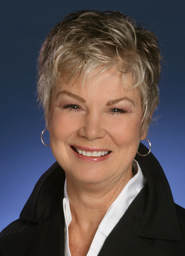
A graduate of Stanford University, Mary Waldmann and her husband Raymond raised three children who are now independent, well-adjusted and happy young adults. Before becoming a mother, she was a successful real estate broker, political consultant and public relations executive, and worked as a part-time communications consultant when her children were young. Mary is the author of Six-Word Lessons on Winning with Today's Media , Six-Word Lessons for Intentional Parenting, and Six-Word Lessons for Compelling Speeches.
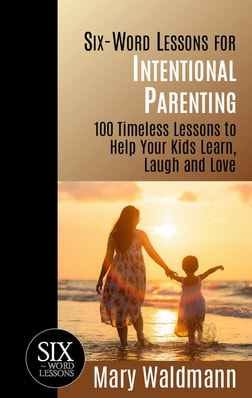 I read an interesting article in the new Atlantic Monthly magazine today, parts of which I’d like to share with you. Those of you who’ve read my Six-Word Lessons for Intentional Parenting know that I talk about parenting in a way that teaches empathy, conscience and responsibility for actions. In this article, How to Guilt Trip Your Kids (They’ll Thank You Later), author Libby Copeland cites numerous studies about guilt and conscience in young children. Children aren’t born knowing how to say “I’m sorry”. Conscience and guilt feelings don’t begin to develop until age 3 or later and you need to encourage it. As Copeland says, “In the popular imagination, of course, guilt still gets a bad rap…guilt is deeply uncomfortable… Who wants to inflict that discomfort on a child?” Yet guilt can have a positive purpose. Guilt, by prompting us to more deeply think about our own goodness, encourages humans to atone for mistakes and fix relationships. It’s a glue that holds a co-operative species like humans together—kind of a social glue. As one researcher points out, “It’s incredibly important to nurture empathy, but I think it’s equally important to promote guilt.” If you find the idea of guilting your child distasteful, keep in mind that ‘good guilt’ is very different from telling your child that disobedience proves her unworthy or that you’re ashamed of her (please, never say that!). This isn’t your grandmother’s guilt trip. The point isn’t to make your child feel bad about herself. The point is to encourage conscience, goodness, empathy, resilience and a willingness to fix mistakes. You may already be guilting your child in a healthy way. “Look, your friend is crying because you took his toy.” Ideally, your child feels guilty, is moved to empathy, and you can help him figure out how to atone for his behavior. Studies also show that using “empathy-based guilt” on your teenagers makes them tend to see fairness and honesty as part of who they are. Guilting shouldn’t result in a sermon, but rather in a “what can you do about it” discussion. And the discussion will go better if tempers have cooled down. And, as Copeland points out, “Guilt has the potential to be especially helpful now, in a world that is growing more divided…’good’ guilt may have the ability to bring us together. It’s a radical proposition” but definitely something we need to consider. So don’t hesitate to guilt your kids in a positive way—It’s good for them and for our world.  A graduate of Stanford University, Mary Waldmann and her husband Raymond raised three children who are now independent, well-adjusted and happy young adults. Before becoming a mother, she was a successful real estate broker, political consultant and public relations executive, and worked as a part-time communications consultant when her children were young. Mary is the author of Six-Word Lessons on Winning with Today's Media , Six-Word Lessons for Intentional Parenting, and Six-Word Lessons for Compelling Speeches. 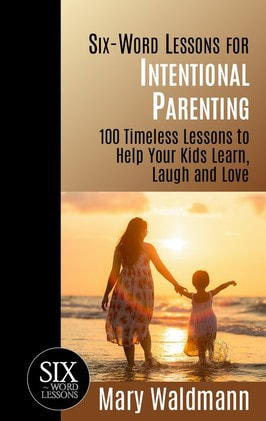 “Skip the children’s Instagram pageant.” That’s the message Jennifer Taitz has for parents in her November 26 Wall Street Journal column. highly recommend it as reading for parents and grandparents. She begins by saying, “’How many likes did I get?’ When I overheard a friend’s 8-year-old-daughter ask how her back-to-school portrait had performed on her mother’s Instagram, my heart fell. No child should grow up believing life is a continuous popularity contest judged on social media.” Taitz also wonders how parents can navigate sharing proud pictures of their child while relaying to the child that life is about more than presenting the perfect image. Taitz weighed the costs and benefits of social media in her life and realized that signing up for Instagram would only tempt her to be more superficial. She also worried about the example she would be setting for her children. She goes on to say that in her mind, “healthy living requires participating in the moment in a meaningful way. That’s not easy to do while staging and posting photos, then tracking responses.” She quotes Robin Barman, her favorite psychiatrist and author of Permission to Parent, as telling parents to look at our children with “hearts in our eyes, truly seeing who they are with warmth. But it’s difficult to appreciate a child’s inner world from the vantage point of an iPhone camera.” Many years ago, when our youngest daughter was 4 years old and taking dance classes, the director of the dance studio clearly understood this challenge. The annual dance recital was a major production in a large university theater with professional lights and sound. Parents were allowed to take photos and use video cameras during the dress rehearsal, but cameras were strictly forbidden during the actual performance. “Miss Emily” understood that not only did camera flashes and people standing in the aisles with videocams distract from the performance, but more importantly, she wanted parents and grandparents to watch the children’s dancing with “hearts in their eyes,” drinking in what our little ones—and all the little ones—were proudly performing rather than zooming our focus in on a viewfinder image. Miss Emily got it right…and she forced us to get right. Some years later I found myself for several years the producer of our elementary school’s Christmas program, which, thanks to a very talented music teacher, was a grand costumed extravaganza of dance and song, Parents were not invited to our dress rehearsal so there was not opportunity to take photos then. But after one year of the children’s entrances being blocked by parents in the aisles with their video cameras, or standing in front of others to take photos, I realized that I had to take action. My solution was to find a parent who was a professional videographer. I persuaded him to record the entire program and make copies available at cost to any parent who wanted to order them. Then I adopted Miss Emily’s policy and we banned cameras at the performance. Parents loved having the video of the entire program, but now they could enjoy seeing their children with “hearts in their eyes.” They were able to pay close attention to the children they adored. And that’s what our kids want and need. Taitz, a psychologist, says she can imagine the young girl she quoted as saying “How many likes did I get?” sitting on her therapy couch a decade from now, describing how her well-meaning mother chronicled her every move for a distant audience rather than paying close attention to her. And who could blame her for feeling frustrated and a little resentful? So maybe during this holiday season, we should consider setting aside the picture posting at least part of the time and just watching the joy in our children’s eyes as they talk to Santa, open gifts and play with their grandparents, rather than recording and sharing it all on social media. Let’s let our children have our total loving attention and forget about the Instagram and Facebook audience. Happy holidays!  A graduate of Stanford University, Mary Waldmann and her husband Raymond raised three children who are now independent, well-adjusted and happy young adults. Before becoming a mother, she was a successful real estate broker, political consultant and public relations executive, and worked as a part-time communications consultant when her children were young. Mary is the author of Six-Word Lessons on Winning with Today's Media , Six-Word Lessons for Intentional Parenting, and Six-Word Lessons for Compelling Speeches. 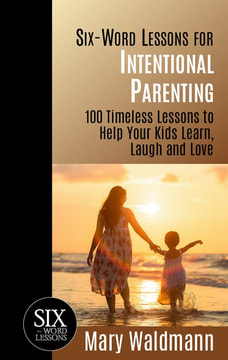 We had lunch at a casual pizza place the other day, but our meal was marred by the behavior of two little girls in a nearby booth. They were having a great time but, unfortunately that involved a lot of loud screeching. At one point, one of them was standing on the seat and waving her pizza slice like a flag. Needless to say, they were quite a distraction. I think parents today often overlook the importance of teaching their children basic table manners and social skills. We were chatting with our youngest daughter, now 29, recently and she told us one of the things she appreciated about our parenting was our insistence that she and her siblings learn good manners. She said, “At, the time, I got really annoyed with the constant reminders to keep my arms off the table, chew with my mouth closed and not talk with food in my mouth. But now I really see the value because I find myself comfortable and confident dining with people of any social class.” That comfort and confidence is a gift you can give your children. Expensive consultants now teach manners courses for young executives who realize that they lack some of the basic social skills—like table manners—which stand in the way of their advancement and success. Shouldn’t parents be teaching them that from the very beginning? And don’t underestimate the value of gentle guidance by grandparents. Sure, it takes time, attention and persistence. But even young children can be taught to eat with their hands only when it’s something appropriate like corn-on-the-cob or fried chicken. They can be taught “no chewing with your mouth full,” or , “no talking with food in your mouth,” and “arms off the table and napkin in your lap.” They can be taught to engage in table conversation with the rest of the family—with no interrupting. This requires regular dining as a family, both at home and occasionally in restaurants. Kids also need to be taught appropriate behavior in public, such as restaurants and places of worship. For instance, running around and loud talking aren’t appropriate. If kids haven’t been taught to behave in social situations, they risk annoying others and not being welcome. And if the parents don’t maintain control, they may even be reprimanded by strangers (I’ve done it) for really inappropriate behavior which disturbs others. I don’t think we want any of those things for our kids. Similarly, teaching them to share, to acknowledge gifts and respond appropriately to introductions will pay off as they become older and enter the adult world. Etiquette exists for a reason and it exists in all cultures because it lubricates our social interactions and helps us to get along. And don’t we all want our children growing up to be comfortable and successful in social situations? Teaching our children manners is really one of the responsibilities of good parenting. It makes life more pleasant for you, your child, and others. And it will stand them in good stead as adults.  A graduate of Stanford University, Mary Waldmann and her husband Raymond raised three children who are now independent, well-adjusted and happy young adults. Before becoming a mother, she was a successful real estate broker, political consultant and public relations executive, and worked as a part-time communications consultant when her children were young. Mary is the author of Six-Word Lessons on Winning with Today's Media , Six-Word Lessons for Intentional Parenting, and Six-Word Lessons for Compelling Speeches. 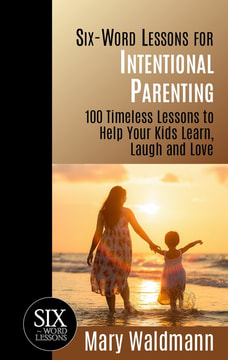 I’ve been reading more and more articles recently about the impact of cell phones on the current generation of teenagers and preteens. In the September Atlantic Monthly, Dr. Jean Twenge, a professor at the University of California at San Diego, asked “Are cell phones destroying a generation?” She explains how the explosion of cell phone use by today’s teenagers—whom she dubs the “iGeneration—has skyrocketed compared to the Millennials just a decade older. She says we now have a generation shaped by cell phones and social media. II think most parents vastly underestimate the influence of these screens on their teenagers and, increasingly, preteens. Cell phone usage, internet cruising and social media are literally shaping their lives. Citing numerous studies, Twenge shows the clear correlation between rising cell phone usage among teens and the concomitant rise in feelings of loneliness, social isolation and FOMO—fear of missing out. Today’s teens spend more time on their phones than they do going out with friends. They are less independent than the Millennials were at the same age. Online bullying has increased, and nighttime use of cell phones is causing sleep deprivation. Even more frightening, the depression and suicide rates among teens have skyrocketed since 2011. Twenge says “It’s not an exaggeration to describe iGeneration as being on the brink of the worst mental health crisis in decades. Much of this deterioration can be traced to their phones.” Is she being an alarmist? I don’t think so. I recently talked to a very mature high school senior who told me she had realized that her cell phone was dominating her life and becoming an addiction. Wise beyond her years, she decided to set some boundaries for her phone usage. So she now turns the phone off by mid-evening and doesn’t turn it on again until breakfast. She feels more in control of her life and is getting more sleep without the late-night screen checking. While her example is admirable, I doubt that most teens have the perceptiveness and discipline to make rules for themselves. So what’s a parent to do? Even senior internet company executives are concerned about their kids and cell phones, as evidenced by a recent Wall Street Journal article. The best time to imposed rules and limits is when your kids receive their first cell phone. After they have had free use of it for very long, it’s very difficult to put the genie back in the bottle. I talked to one mother who, when her 10-year-old son was clamoring for a cell phone and she agreed that she’d like being able to get hold of him by phone, decided to buy him a flip-phone rather than a full-fledged smart phone. He can call and text his friends, but for now he’s protected from the dangers of social media and unlimited internet access. If you set limits at the outset, it’s much easier to maintain some control as the kids get older. Another mother told me that when she gave her two middle-school daughters cell phones, she retained the chargers and they remain in her bedroom. Each evening the girls are required to turn their phones in for charging and they don’t get them back until breakfast. This way mom is helping to prevent addiction and assuring that her daughters’ sleep isn’t interrupted by phone checking or text messages. Clearly, it’s important that both parents be on the same page when it comes to cell phones, when the kids get them and how they use them. If dad says “no cell phone yet” to a preteen but then mom buys him one for his birthday there’s a problem form the get go. The preteen in question is now spending a lot of time on his phone which was earlier spent playing with a sibling, drawing or reading, and engaging with his parents. Before getting a child a smart phone, parents need to sit down for a serious conversation about whether the child is old enough for a phone and, if so, how and when their child is going to use the phone. Then a serious conversation needs to occur with the child about appropriate and inappropriate use of the phone. And that conversation needs to continue as the child matures. As NPR’s Anya Kamenetz says, “Enjoy screens. Not too much. Mostly together.” As she points out, once kids have full access to phones, strict rules are less important than talking to your kids about how they respond to social media. Listen to them. Discuss how the phone affects their lives and behavior. Clearly, smart phones and internet access can have very positive uses. Explore the internet with your kids and help them use it to research topics that interest them. Encourage them to stay in touch with friends and relatives, particularly the distant ones. But be aware of the potential pitfalls and take measures to safeguard our kids and always remember the importance of face time with your child from infant through the teens. Never let a screen be the substitute for your attention and interaction.  A graduate of Stanford University, Mary Waldmann and her husband Raymond raised three children who are now independent, well-adjusted and happy young adults. Before becoming a mother, she was a successful real estate broker, political consultant and public relations executive, and worked as a part-time communications consultant when her children were young. Mary is the author of Six-Word Lessons on Winning with Today's Media , Six-Word Lessons for Intentional Parenting, and Six-Word Lessons for Compelling Speeches. 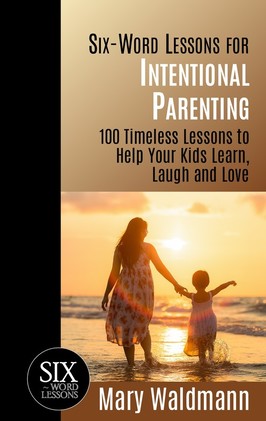 With the arrival of September, school begins---and for many children, especially adolescents, pressure to achieve also accelerates. In many families, the new school year focuses on teens building a perfect college application, with top grades and test scores, as well as stellar extracurricular activities. As parents struggle with how best to motivate their children to succeed, they would do well to read the article in the September 1, 2018 Wall Street Journal by Jennifer Wallace, entitled The Perils of the Child Perfectionist. To elicit their child’s best effort, many parents set a high bar for achievement. Some, however, set a standard of near-perfection, pushing their children to become perfectionists. As Wallace points out, “Unlike hardworking people who enjoy striving for lofty goals and cope well with setbacks, perfectionists aim for high standards in order to demonstrate their worth to others, and then are brutally critical of themselves when they fall short.” They’re always chasing a carrot which they can never catch because there’s always something better out there. And they become acutely aware of how they’re doing relative to their peers. As Wallace also points out, perfectionism can lead to serious mental health issues, including anxiety, depression, eating disorders and even suicidal thoughts. And, according to a major research study, perfectionism has risen quite significantly over the past few decades, by as much as 30 percent.. “Researchers point to several contributing factors, including more unrealistic expectations and more anxious and controlling parents than generations before.” I can’t help but wonder if this increasing perfectionism isn’t a major factor in the equally significant rise in teen depression, anxiety and suicide. So how do we parents avoid making perfectionists of our children? The key is unconditional love for your child, something I stressed repeatedly in my book, Six-Word Lessons for Intentional Parenting. We can help and encourage our kids to succeed, but we must always avoid the message that we won’t love them if they fall short. And we need to avoid the pitfall of confusing our child’s success with our own. When I was growing up, my parents set very high standards and made it clear that my success reflected—whether well or poorly—on them. I felt their love was conditioned on my performance and I became, naturally, a perfectionist. The tendency to set standards for myself too high and then fault myself for not achieving them is something I fought for decades. I like to think I have healthier attitudes and expectations at this point in my life, but I have to confess that my perfectionist tendencies still occasionally crop up. So how do we encourage a child’s best performance without driving them to perfectionism? As one researcher says in the Wall Street Journal article, “There’s absolutely nothing wrong with wanting kids to strive to be the best that they can be, but parents need to be careful how they communicate that desire: what they praise, how they praise” and we need to make clear that we have unconditional love and affection for our children, no matter what their level of achievement. We need to be careful of the messages we send with things like “I want to see straight A’s on your report card” or by withholding praise, or event comment, for a less-than-perfect performance. There are healthy ways to encourage high performance without creating problems. As one psychologist quoted in the article says, “When it comes to pushing a child, a parent’s energy should be spent on encouraging good study habits, not focusing on shiny outcomes.” Set standards for how the homework gets done—tackling it early in the afternoon when the child is freshest with no electronics or distractions—rather than for the homework grade itself. Parents can also put grades in context: a bad grade doesn’t predict the child’s future performance or alter their parents’ love for them. So as school begins, don’t be afraid to encourage your children to set high standards for themselves. Support them in developing good study habits and teach them to be proud of their achievements. But always let them know that your love is unconditional, through both words and actions. As the article concludes, “We teach a child to see themselves not as a grade or a performance but as a whole and complex person when we as parents embrace the whole and complex person they are today.”  A graduate of Stanford University, Mary Waldmann and her husband Raymond raised three children who are now independent, well-adjusted and happy young adults. Before becoming a mother, she was a successful real estate broker, political consultant and public relations executive, and worked as a part-time communications consultant when her children were young. Mary is the author of Six-Word Lessons on Winning with Today's Media , Six-Word Lessons for Intentional Parenting, and Six-Word Lessons for Compelling Speeches.  A news reporter has called you for an answer or comment on something relating to you personally, your business or your organization. Do you panic? Do you have a program, project or community concern to communicate? Speaking with the news media can be your most efficient and cost-effective way to reach an audience. Being a prepared and effective media spokesman is a tremendous professional asset. How do you achieve that? Do you really need to spend thousands of dollars on media training workshops or individual coaching? I don’t think so. I believe that there are 10 basic rules you must follow to successfully deal with the news media. Let’s discuss a few of the key principles. Many people fear dealing with the news media, but doing so may be essential to the success of your business or organization. You don’t need to be afraid of negative or challenging questions. With some basic knowledge you can respond effectively. The more you know about dealing with reporters, the less trepidation you’ll have about doing so. Preparation is one key to successfully conveying your position. There really are ways you can be prepared for that unexpected media call. If you’re selling a story, preparation is essential. You need to know the facts and have data or anecdotal information to back them up. With basic preparation, you can frequently anticipate questions before they are asked. Be articulate and concise in your responses to media questions. Remember that reporters are always looking for “sound bites”, short, snappy quotes which will draw attention to their story. The story is what it’s all about. Successful reporters get their stories in print or on the air. Conflict is often the basis of a story but there are ways to deal with it. And the more you can further a good story and in so doing help the reporter, the better your relationship with that reporter will be on an ongoing basis. Remember that honesty is essential in dealing with the news media. As today’s top stories illustrate, lies will almost always come to light. Caught lying, you destroy your credibility with reporters and that will likely hurt you in the future. If you continue to deny lying, you prolong the story and your situation in the media will quickly deteriorate You are not obliged to tell everything you know but lying about a specific question or allegation will always come back to bite you. And remember that telling half-truths or deliberately misleading a reporter is the same as lying. There are technical competencies which will improve your effectiveness in broadcast interviews. And there is a simple way to avoid having your interview edited in a way the puts your remarks out of your context. Being edited in a damaging way is often a concern for those dealing with television and radio. Broadcast interviews are where 30-second “sound bites” are frequently used and there are things you can do to keep them snappy and more usable without being taken out of context. Remember that using concise, snappy sound bites will always work to your advantage. Have you noticed we tend to see the same people—financial analysts, consultants, retired generals or former politicians--being asked for comments over and over again? This is not just because they have knowledge and experience in their field—there are thousands of people who have that. You see the same individuals repeatedly because they provide good sound bites. If you do the same, reporters will return to you for comments on your views or analysis of situations and issues. This enhances your reputation as an expert which helps your business, organization or cause. Effective communication with the news media is essential to the success of businesses and organizations. Controlling your message and avoiding blunders makes you a great asset to your organization. You need not fear media attention and you can make it work to your advantage if you know what to do. All it takes is basic knowledge and some practice.  Mary Waldmann's expertise as a speech writer and media expert spans over 30 years including among other roles Public Affairs Director for the US Department of Commerce during the Reagan Administration. She is the author of Six-Word Lessons on Winning with Today's Media , Six-Word Lessons for Intentional Parenting, and Six-Word Lessons for Compelling Speeches. 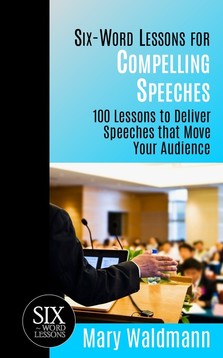 You’ve been asked to give a speech. Or you want to seize the opportunity to persuade a large or small group. Are you confident or anxious? Do you know how to prepare for an effective presentation or are you at a loss about where to begin? Do you look forward to the opportunity or do you have stage fright? Are you worried about getting difficult questions? Will you be successful at convincing or inspiring your audience or will your speech be boring, long-winded or just ineffective? Are you an experienced speaker but feel that you could improve? There are likely to be many points in your life at which you, your business or organization can tremendously benefit from effective presentations. And there are many types of presentations: formal and relatively casual or formal; brief remarks or a 30-minute speech; to small groups or large. It is a skill required for real success as any executive or community leader. And “skill” is a key word here. Effective and inspiring speech making is not an inborn talent; it is an acquired skill which anyone can learn. I believe that there are ten easy lessons you need to learn in order to be an effective speaker. Let’s talk about a few of them. You cannot give an effective speech without knowing your audience. Who they are, their rough demographics, what brings them together, their opinions or viewpoints are all very important information. So, too, is information about the facility in which you’ll be speaking—attention to things like room set-up, sound and A/V details, even the time of day are important if you’re going to do your best job. You find out all these things by asking questions prior to beginning your speech preparation. Preparation is then key. Unless you are a highly skilled and experienced speaker, you should never “wing it.” Despite the popular notion that his witticisms and debate comments were spontaneous, Winston Churchill--an extremely effective and inspiring speaker-- was reported by his valet to have come up with many of them while soaking in the bathtub! You probably don’t need to go to those lengths, but you still need to do some things to prepare. When it comes to writing the actual presentation there are a number of guidelines to follow. If you know your audience in advance, you can tailor you remarks to them. You need to open with a “grabber,” something that engages the audience right at the outset and makes them want to listen to you. You need to clearly state your points. Remember the old adage about telling them what you’re going to say, telling it, then telling them what you said. You need persuasive facts or anecdotes as well as a clear conclusion which motivates your audience. You need to remember are that you are more informed about or engaged with your topic than is your audience. If that weren’t the case, you wouldn’t have been asked to speak. Also, most audiences are interested in what you have to say and basically want to like you. If they’re not likely to go for your views, you need to know that in advance and take the necessary steps during your preparation. Appropriate follow-up can also be key to giving successful presentations. If you keep all these things in mind, you can walk into a speech with enthusiasm and confidence, well prepared, and you’ll be effective and persuasive in convincing your audience. Always remember that speech-making is not a talent, it’s a learned skill which requires preparation and practice to achieve. And it’s an important skill, both personally and professionally, for you to possess. No matter what your trepidations about giving a speech are right now, with informational lessons and practice you can become a convincing, inspiring and highly effective speaker. You may even come to enjoy public speaking!  Mary Waldmann's expertise as a speech writer and media expert spans over 30 years including among other roles Public Affairs Director for the US Department of Commerce during the Reagan Administration. She is the author of Six-Word Lessons on Winning with Today's Media , Six-Word Lessons for Intentional Parenting, and Six-Word Lessons for Compelling Speeches. |
See the Authors!
All
|

 RSS Feed
RSS Feed